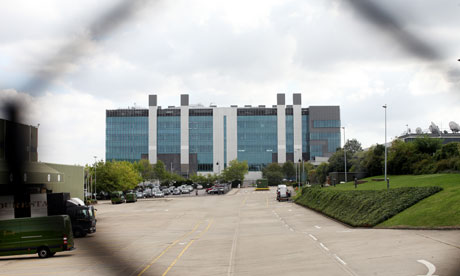
BSkyB HQ in west London. Accounts show most of the income from Sky magazine was recycled back to Sky TV. Photograph: Graeme Robertson for the Guardian
A magazine for satellite TV customers published by BSkyB was used as atax avoidance scheme that saved the company up to £40m a year.
The broadcaster had been saving millions in VAT by charging satellite customers a nominal £2.20 a month for the Sky magazine, using a tax loophole that has now been closed. Magazines, along with books and newspapers, are normally zero-rated for VAT, and this meant Sky could avoid VAT on a small but significant percentage of revenue. The saving, at about £3 to £4 per person, would have amounted across Sky's 10 million subscribers to at least £30m to £40m a year.
A court battle involving Debenhams at the beginning of the decade highlighted the problem of VAT avoidance through the artificial splitting of services between different parts of a corporation.
But in 2005 UK courts ruled that cable companies were allowed to deduct VAT on "cable guide" magazines and similar publications, if they structured them so that customers did receive a genuine product from a separate company, delivered at a fair price.
In 2005 Sky relaunched BSkyB Publications with James Murdoch on the board, and in 2007 they took production of Sky magazine in-house and also began distributing Sky Sports magazine and Sky Movies magazine. A small note on the Sky magazine masthead in 2011 told readers: "£2.20 of your package price is paid by you to BSkyB Publications Ltd for this magazine."
Some readers raised objections on online talkboards to the fact that when they had tried to cancel the "crap" magazine they had been told that their subscription was discounted by the magazine's price, and if they opted out they would no longer get the discount.
"What Sky are doing is saving themselves some VAT. It's perfectly legal and it's something any efficient company would do," wrote one poster.
BSkyB Publications' accounts show that most of the income from the supposed monthly price of the magazine was recycled back to Sky TV, described in its books as payments for "customer data" and "support services". This left only a modest apparent profit on BSkyB Publications' accounts. But in December 2010, apparently as a sop to Liberal Democrat and UK Uncut campaigning on the issue of tax avoidance, the Treasury minister David Gauke announced a variety of anti-tax avoidance measures, to be enacted in the following spring. This included legislation against VAT "supply-splitting".
In February 2011, when the legislation was published in the same form despite energetic lobbying, Sky said it would end publication of Sky Movies magazine and Sky Sports magazine, and downsize Sky magazine, with a potential loss of 20 jobs. Coming in the middle of the financial crisis, it was widely perceived as a cash-saving exercise.
A fresh inquiry launched by the Metropolitan police into phone hacking was also occupying people's minds. By October all publications had been pulled, and BSkyB Publications was also being wound down. A footnote in Sky's quarterly report for September 2011 noted that Sky had previously recognised benefit from the zero-rated VAT treatment at about £3 to £4 per head, but that this had now been "restated".
A spokesman for HM Revenue and Customs told the Guardian it was not possible to comment on individual cases. "If there is some kind of contrived scheme or vehicle, ie it's obvious that the purpose of the scheme is to avoid paying VAT and it's taking advantage of a loophole and we consider that tax is actually owed on the scheme, rather than just being a case of sensible tax planning … we can make the judgment that this is not legitimate tax planning. And if we consider that somebody has not applied the rules we will then go back three to four years and if there is back tax owing we will ask them for it."
Sky said in a statement: "The TV listing magazine that Sky used to publish was, in common with all newspapers and magazines, zero-rated for VAT. Sky directly contributes more than £1bn a year in tax – a total of 1.4% of all taxes paid by the 100 largest FTSE companies. We're proud of the significant – and growing – contribution we make to the British economy."
John Christensen of Tax Justice Network said: "Tax avoidance is deeply engrained in Britain's corporate culture. While the government's proposed general anti-avoidance rule will go some way to remedying this, more needs to be done to put pressure on accountants, tax advisers and tax lawyers to build tax compliance into their professionals norms and guidelines. Tax avoidance is now a high-risk activity, not just to the companies involved, but also to the reputations of their professional advisers."





















































